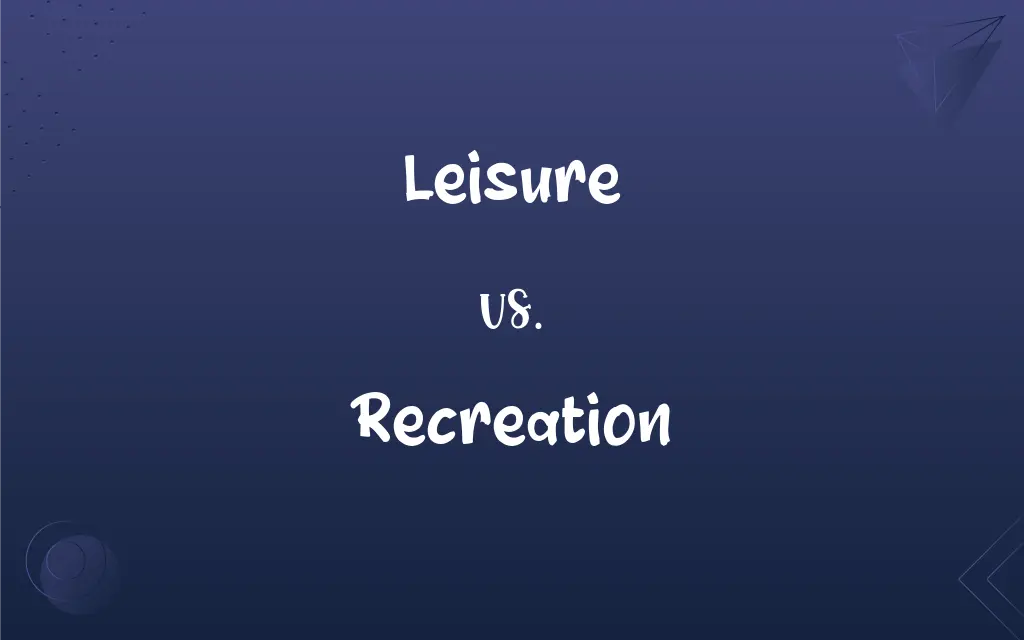Leisure vs. Recreation: What's the Difference?
By Harlon Moss & Janet White || Published on May 24, 2024
Leisure is the free time available for enjoyment, while recreation involves activities undertaken for enjoyment during leisure time.

Key Differences
Leisure is the time one has free from obligations or work, dedicated to rest or pleasure. It is characterized by freedom from time-consuming duties, allowing individuals to engage in activities of their choice. Leisure time is subjective and varies greatly depending on personal circumstances and societal norms. Recreation, on the other hand, refers specifically to activities engaged in for enjoyment, amusement, or pleasure during leisure time. These activities are often physical or intellectual pursuits designed to refresh the body and mind.
Leisure encompasses a wide range of activities, including passive ones like reading, listening to music, or daydreaming. It is not necessarily goal-oriented and can involve any activity that provides a sense of relaxation and well-being. Recreation often involves social interaction and can be organized or spontaneous. Activities such as sports, games, hiking, and arts and crafts are common forms of recreation. These activities are usually more structured than leisure activities and often have specific goals or outcomes, such as improving fitness, learning a new skill, or achieving a sense of accomplishment.
While leisure and recreation are closely related, the main distinction lies in the nature of the activities. Leisure is a broader concept that includes any free time activity that brings joy and relaxation, whereas recreation specifically refers to activities undertaken for enjoyment, amusement, or health benefits during leisure time.
Comparison Chart
Definition
Free time for enjoyment without obligation.
Activities specifically for enjoyment during leisure time.
Nature
Can be passive or active.
Generally active and often structured.
ADVERTISEMENT
Purpose
Personal satisfaction and relaxation.
Enjoyment, amusement, or health improvement.
Engagement
Can be solitary or social, not necessarily goal-oriented.
Often involves social interaction and may have specific goals.
Examples
Reading, daydreaming, listening to music.
Sports, hiking, arts and crafts.
Leisure and Recreation Definitions
Leisure
State of being free from stress.
Leisure activities help in maintaining a calm state of mind.
Recreation
Leisure activities involving physical exertion.
Swimming is his favorite recreational activity.
ADVERTISEMENT
Leisure
Time free from work or duties.
She spent her leisure reading novels by the fireplace.
Recreation
Pursuits outside of work to refresh the spirit.
She sees travel as an essential form of recreation.
Leisure
Opportunity to engage in hobbies.
Gardening is her preferred leisure activity.
Recreation
Activity done for enjoyment when not working.
They went hiking as a form of recreation.
Leisure
Freedom to choose activities for enjoyment.
In his leisure, he enjoys painting landscapes.
Recreation
Engaging in sports or cultural activities for fun.
The city offers many recreation programs for residents.
Leisure
Period of relaxation.
Weekends are reserved for leisure and family time.
Recreation
Activities that contribute to health and well-being.
Regular recreation is key to a balanced lifestyle.
Leisure
Free time when one is not working or attending to other duties.
Recreation
Physical or mental activity pursued primarily for pleasure.
Leisure
Relaxation or activities engaged in during such time
The pursuit of leisure.
Recreation
An activity, such as a game or hobby, that is pursued primarily for pleasure.
Leisure
Freedom provided by the cessation of activities.
Recreation
The act of creating something again
Undertook the recreation of levees after the flood.
Leisure
Free time, time free from work or duties.
Recreation
Something that has been created again
Published a recreation of the original version of the oratorio.
Leisure
Time at one's command, free from engagement; convenient opportunity; hence, convenience; ease.
Recreation
The act of making something to be a copy of something else
Assisted in the filmmakers' recreation of an earlier era.
Leisure
Freedom from occupation or business; vacant time; time free from employment.
The desire of leisure is much more natural than of business and care.
Recreation
Something that is made as a copy; a replica; a duplicate
Visited a recreation of a colonial village.
Leisure
Time at one's command, free from engagement; convenient opportunity; hence, convenience; ease.
He sighed, and had no leisure more to say.
Recreation
Any activity, such as play, that amuses, diverts or stimulates.
Leisure
Unemployed; as, leisure hours.
Recreation
The process of creating something again.
Leisure
Time available for ease and relaxation;
His job left him little leisure
Recreation
The result of this process.
Leisure
Freedom to choose a pastime or enjoyable activity;
He lacked the leisure for golf
Recreation
The act of recreating, or the state of being recreated; refreshment of the strength and spirits after toil; amusement; diversion; sport; pastime.
Recreation
An activity that diverts or amuses or stimulates;
Scuba diving is provided as a diversion for tourists
For recreation he wrote poetry and solved crossword puzzles
Drug abuse is often regarded as a form of recreation
Recreation
Activity that refreshes and recreates; activity that renews your health and spirits by enjoyment and relaxation;
Time for rest and refreshment by the pool
Days of joyous recreation with his friends
FAQs
What is leisure?
Leisure is the time available for ease, relaxation, and activities of one's choice free from the demands of work or duty.
What is recreation?
Recreation involves engaging in activities that are enjoyable and fulfilling during one's leisure time, often with a focus on physical or mental stimulation.
How does leisure differ from recreation?
Leisure refers to free time itself, while recreation refers to specific activities undertaken for pleasure during that free time.
Why is recreation important?
Recreation is important for improving physical and mental health, reducing stress, and enhancing quality of life.
Can leisure time be used for activities other than recreation?
Yes, leisure time can be used for a wide range of activities, including rest, relaxation, and personal interests, not all of which are recreational.
Are all recreational activities physical?
Not all recreational activities are physical; many involve intellectual or creative pursuits.
Can work be considered leisure?
Work is typically not considered leisure because leisure is defined by freedom from obligations or duties, including work.
How do leisure activities contribute to well-being?
Leisure activities contribute to well-being by providing rest, relaxation, and opportunities to pursue interests and hobbies that bring personal satisfaction.
Can leisure and recreation change over time?
Yes, individuals' preferences for leisure and recreational activities can change over time due to factors like age, lifestyle changes, and cultural shifts.
What are some examples of leisure activities?
Examples include reading, gardening, listening to music, and watching movies.
How do leisure and recreation contribute to social life?
They provide opportunities for socializing and building relationships through shared interests and activities.
Is reading a book considered leisure or recreation?
Reading a book can be considered both leisure and recreation, depending on the individual's perspective and the purpose of reading.
How can one find time for leisure and recreation?
Managing time effectively and prioritizing self-care can help individuals find time for leisure and recreation.
What role does technology play in leisure and recreation?
Technology can enhance leisure and recreation through entertainment, virtual social interactions, and access to information and activities.
Can leisure activities be productive?
Leisure activities can be productive in terms of personal development, relaxation, and enjoyment, but they are not typically productive in the economic sense.
Do leisure and recreation have the same benefits?
Both can offer benefits like stress reduction, improved mental and physical health, but the specific benefits can vary based on the activity.
What are some common recreational activities?
Common recreational activities include sports, hiking, cycling, and arts and crafts.
Is there a difference between indoor and outdoor recreation?
Yes, indoor recreation may involve activities like yoga or chess, whereas outdoor recreation includes activities like hiking and sports.
How do societal norms influence leisure and recreation?
Societal norms can influence the types of leisure and recreational activities people engage in and how much time is devoted to them.
Can leisure and recreation lead to personal growth?
Engaging in diverse leisure and recreational activities can contribute to personal growth by expanding skills, interests, and experiences.
About Author
Written by
Harlon MossHarlon is a seasoned quality moderator and accomplished content writer for Difference Wiki. An alumnus of the prestigious University of California, he earned his degree in Computer Science. Leveraging his academic background, Harlon brings a meticulous and informed perspective to his work, ensuring content accuracy and excellence.
Co-written by
Janet WhiteJanet White has been an esteemed writer and blogger for Difference Wiki. Holding a Master's degree in Science and Medical Journalism from the prestigious Boston University, she has consistently demonstrated her expertise and passion for her field. When she's not immersed in her work, Janet relishes her time exercising, delving into a good book, and cherishing moments with friends and family.






































































